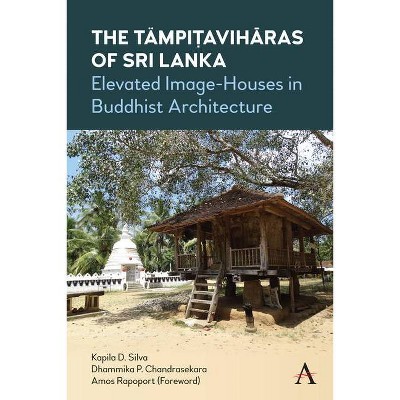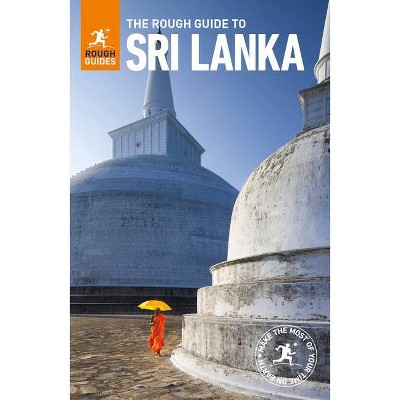The Tämpiṭavihāras of Sri Lanka - by Kapila D Silva & Dhammika P Chandrasekara (Hardcover)

Similar Products
Products of same category from the store
AllProduct info
<p/><br></br><p><b> About the Book </b></p></br></br><p><em>The Ṭämpiṭavihāras of Sri Lanka</em> focuses on one distinctive Buddhist architectural practice from pre-modern Sri Lanka - the construction of Buddha image-houses on elevated wooden platforms supported by stone pillars. </p><p/><br></br><p><b> Book Synopsis </b></p></br></br><p><em>The Ṭämpiṭavihāras of Sri Lanka</em> focuses on one distinctive Buddhist architectural practice from pre-modern Sri Lanka - the construction of Buddha image-houses on elevated wooden platforms supported by stone pillars. As a centre of Buddhism, Sri Lanka has a rich tradition of erecting Buddha image-houses, the origin of which dates to the fifth century. Yet, the <em>ṭämpiṭavihāra</em> tradition only existed from the thirteenth to the nineteenth centuries. The <em>ṭämpiṭavihāra</em> is an exceptional type of image-house, not only for its specific timeframe and unique construction technology, but also for its complex architectural conception of the Buddhist worldview and soteriology. Except for this period of Sri Lankan history, this architectural exemplar does not exist in anytime or anywhere in the entire Buddhist world. This book examines the significant aspects of <em>ṭämpiṭavihāra</em> architecture and documents some of the distinctive examples with an analysis of their architectural design and symbolic content.</p> <p>Richly illustrated with photographs and drawings, the book is organized into two parts. The first part examines the significant historical, cultural, and architectural aspects of <em>ṭämpiṭavihāras</em> in depth. The second part documents fifty of the distinctive examples of <em>ṭämpiṭavihāras</em> in the country with an analysis of their architectural designs and symbolic content. Each example is illustrated with architectural drawings of its plans, elevations, and sections along with photographs. The book also includes a list of over 200 extant <em>tämpiṭavihāras</em> in the country. This book is the very first comprehensive examination of the subject of <em>tämpiṭavihāras</em> published in any language and made available for a global audience. It narrates the story of <em>ṭämpiṭavihāra</em>s from a multidimensional perspective that involves architecture, anthropology, archaeology, art history, geography, history, sociology, and theology. Consequently, it appeals to a vast array of enthusiasts of these disciplines in addition to scholars in Asian studies, South Asian studies, Sri Lankan studies, and Buddhist studies.</p><p/><br></br><p><b> Review Quotes </b></p></br></br><br><p>'<em>The Tämpiṭavihāras of Sri Lanka</em> makes an invaluable addition to literature on regional Buddhist religious literature. Its excellent documentation, analysis and presentation of architecture, materials and methods of construction, artistic embellishments as well as vernacular nuances and terminologies of <em>Tämpiṭavihāras, </em> along with the <em>Brikshya-chaitya</em> and the Stupa, raises the book to a laudable act of conservation. I find its creative use of classroom and field learning experiences of students and teachers refreshing, instructive and worth emulating.' -- Sudarshan Raj Tiwari, Lumbini College of Buddhism and Himalayan Studies, Lumbini Buddhist University</p><br><br><p>'The authors provide a systematic and in-depth introduction to Buddhism's history and the tradition of Buddhist heritage in Sri Lanka. The book reveals the hidden treasure of Sri Lankan architecture that was previously understudied or less known. I applaud this book's publication as a valuable addition to the repository of knowledge of Asian architecture. It is indeed an important step to transform Asia from a knowledge consumer into a knowledge producer and a substantial contribution to Architectural discourse in general.' --Dr Johannes Widodo, Director of Graduate Programs in Architectural Conservation, National University of Singapore</p><br><br><p>'This book, a product of 20-years of journey to experience and reveal the spirit of place and distinctiveness of built structure, is a landmark presenting the continuity of history since late medieval period, as illustrated by the distinct shrines built on stone pillars, called ṭämpiṭavihāra. I am sure this will open new avenues for further research.' -- Prof. Rana P.B. Singh, President- Asian Cultural Landscape Association</p><br><p/><br></br><p><b> About the Author </b></p></br></br><p>Kapila D. Silva is a professor of architecture at the University of Kansas, USA.</p> <p>Dhammika P. Chandrasekara is a senior lecturer of architecture and Dean of the Faculty of Architecture at the University of Moraṭuwa, Sri Lanka.</p>
Price History
Price Archive shows prices from various stores, lets you see history and find the cheapest. There is no actual sale on the website. For all support, inquiry and suggestion messagescommunication@pricearchive.us




















